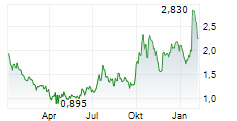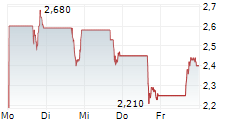- Acumen and JCR aim to develop a product leveraging Acumen's amyloid beta oligomer-selective antibody expertise and JCR's transferrin-receptor-targeting blood-brain barrier-penetrating technology
- Preclinical candidate data expected in early 2026, with exclusive option for Acumen to develop up to two development candidates for the treatment of Alzheimer's disease
- Agreement follows more than one year of engagement to assess technical feasibility and profile series of development candidates
NEWTON, Mass., July 15, 2025 (GLOBE NEWSWIRE) -- Acumen Pharmaceuticals, Inc. (NASDAQ: ABOS) ("Acumen" or the "Company"), a clinical-stage biopharmaceutical company developing a novel therapeutic that targets toxic soluble amyloid beta oligomers (AßOs) for the treatment of Alzheimer's disease (AD), today announced a collaboration, option and license agreement with JCR Pharmaceuticals ("JCR") to develop an oligomer-targeted Enhanced Brain Delivery (EBDTM) therapy for Alzheimer's disease. JCR is a global specialty pharmaceuticals company that applies scientific expertise and unique technologies to research, develop, and deliver next-generation therapies.
While the blood-brain barrier (BBB) protects the human brain from potentially harmful substances, this protective barrier makes it challenging to deliver therapeutics, especially larger molecules like biologics, into the brain at higher quantities. The combination of sabirnetug or additional, novel, AßO-selective antibodies with JCR's BBB-penetrating technology (J-Brain Cargo®) strengthens Acumen's portfolio of AßO-targeted therapies. The partnership is designed to advance potential next-generation treatment options for people living with Alzheimer's disease, by targeting the development of products with enhanced efficacy, safety and convenience.
"We are thrilled to enter into this collaboration pairing Acumen's AßO-targeted antibody expertise with JCR's validated proprietary BBB-penetrating technology after completion of a number of feasibility experiments with JCR over the past year," said Daniel O'Connell, Chief Executive Officer of Acumen. "Coupling Acumen's differentiated mechanistic approach using AßO-preferring antibodies with JCR's innovative transferrin BBB-delivery platform may support the advancement of an exciting next-generation therapeutic option for this area of significant unmet need. Following a robust search and evaluation process assessing multiple technologies in the space, we are excited to formalize this collaboration with an established leader who has successfully developed an approved therapy in Japan. We look forward to producing preclinical data packages in early 2026 that will further inform our EBDTM development strategy."
J-Brain Cargo® technology is JCR's proprietary drug delivery system that efficiently delivers drugs to target tissues, including the central nervous system, through receptor-mediated transcytosis. It is applicable to various modalities including antibodies, enzymes, oligonucleotides, lipid nanoparticles, gene and cell therapy, peptides and decoy receptors. The first drug developed based on this technology is approved in Japan for the treatment of a lysosomal storage disorder, exhibiting an established safety profile.
Acumen's lead program, sabirnetug, is the first humanized monoclonal antibody to demonstrate in AD patients selective target engagement of AßOs, a soluble and highly synaptotoxic form of Aß that accumulates early in AD and is a persistent trigger of synaptic dysfunction and neurodegeneration. The Phase 1 INTERCEPT-AD clinical trial demonstrated sabirnetug was generally well-tolerated with low overall rates of ARIA-E. The trial also showed dose- and exposure-dependent target engagement with AßOs and additionally showed statistically significant amyloid plaque reduction compared to placebo at higher dose multiple-ascending dose cohorts evaluated in the study.
Acumen is currently investigating sabirnetug in ALTITUDE-AD (NCT06335173) a Phase 2, multi-center, randomized, double-blind, placebo-controlled clinical trial that enrolled 542 patients with early AD at sites in the United States, Canada, the European Union and the United Kingdom. Enrollment completion in the trial was announced in March 2025. Acumen plans to share topline results, including efficacy and safety data, in late 2026.
Collaboration Details and Next Steps
- Acumen and JCR have collaborated for more than a year conducting feasibility work to assess the combination of JCR's transferrin targeting technology with Acumen's AßO-targeting antibodies.
- JCR's transferrin receptor binding platform includes a library of both scFv (single chain variable fragment antibodies) and VHHs (variable heavy domain antibodies), molecules related to the full IgG used in their approved therapy, IZCARGO®.
- In addition to sabirnetug, the collaboration is also investigating other oligomer-specific antibodies in Acumen's library to further establish lifecycle opportunities.
- A preclinical candidate (PCC) data package, inclusive of a non-human primate study, is expected in early 2026, at which point Acumen has an exclusive right to exercise its option to develop up to two development candidates.
Financial Terms
- Under the terms of the agreement, JCR will receive an upfront payment and will be eligible for an additional option payment should Acumen exercise its exclusive option to develop up to two development candidates. JCR will also be eligible to receive future development, commercialization and sales milestone payments, as well as single digit percentage royalties on sales of any products that emerge from the collaboration.
About Sabirnetug (ACU193)
Sabirnetug (ACU193) is a humanized monoclonal antibody (mAb) discovered and developed based on its selectivity for soluble amyloid beta oligomers (AßOs), which are a highly toxic and pathogenic form of Aß, relative to Aß monomers and amyloid plaques. Soluble AßOs have been observed to be potent neurotoxins that bind to neurons, inhibit synaptic function and induce neurodegeneration. By selectively targeting toxic soluble AßOs, sabirnetug aims to address the hypothesis that soluble AßOs are an early and persistent underlying cause of the neurodegenerative process in Alzheimer's disease (AD). Sabirnetug has been granted Fast Track designation for the treatment of early AD by the U.S. Food and Drug Administration and is currently being evaluated in a Phase 2 study in patients with early AD.
About ALTITUDE-AD (Phase 2)?
Initiated in 2024, ALTITUDE-AD is a Phase 2, multi-center, randomized, double-blind, placebo-controlled clinical trial designed to evaluate the efficacy and safety of sabirnetug (ACU193) infusions administered once every four weeks in slowing cognitive and functional decline as compared to placebo in participants with early Alzheimer's disease. The study has enrolled 542 individuals with early Alzheimer's disease (mild cognitive impairment or mild dementia due to AD) at multiple investigative sites located in the United States, Canada, the European Union and the United Kingdom. More information can be found on www.clinicaltrials.gov, NCT identifier NCT06335173.
About Acumen Pharmaceuticals, Inc.
Acumen Pharmaceuticals is a clinical-stage biopharmaceutical company developing a novel therapeutic that targets toxic soluble amyloid beta oligomers (AßOs) for the treatment of Alzheimer's disease (AD). Acumen's scientific founders pioneered research on AßOs, which a growing body of evidence indicates are early and persistent triggers of Alzheimer's disease pathology. Acumen is currently focused on advancing its investigational product candidate, sabirnetug (ACU193), a humanized monoclonal antibody that selectively targets synaptotoxic AßOs, in its ongoing Phase 2 clinical trial ALTITUDE-AD (NCT06335173) in early symptomatic Alzheimer's disease patients, following positive results in its Phase 1 trial INTERCEPT-AD. The company is headquartered in Newton, Mass. For more information, visit www.acumenpharm.com.
??
About the J-Brain Cargo® Platform Technology
JCR Pharmaceuticals has developed a proprietary blood-brain barrier (BBB)-penetrating technology, J-Brain Cargo®, to bring biotherapeutics into the central nervous system (CNS). The first drug developed based on this technology is IZCARGO® (INN: pabinafusp alfa) and is approved in Japan for the treatment of a lysosomal storage disorder.
About JCR Pharmaceuticals Co., Ltd.
JCR Pharmaceuticals Co., Ltd. (TSE 4552) is a global specialty pharmaceuticals company that is expanding possibilities for people with rare and genetic diseases worldwide. We continue to build upon our 50-year legacy in Japan while expanding our global footprint into the US, Europe, and Latin America. We improve patients' lives by applying our scientific expertise and unique technologies to research, develop, and deliver next-generation therapies. Our approved products in Japan include therapies for the treatment of growth disorder, MPS II (Hunter syndrome), Fabry disease, acute graft-versus host disease, and renal anemia. Our investigational products in development worldwide are aimed at treating rare diseases including MPS I (Hurler, Hurler-Scheie and Scheie syndrome), MPS II, MPS IIIA and B (Sanfilippo syndrome type A and B), and more. JCR strives to expand the possibilities for patients while accelerating medical advancement at a global level. For more information, please visit https://www.jcrpharm.co.jp/en/site/en/index.html.
Forward-Looking Statements
This press release contains forward-looking statements within the meaning of The Private Securities Litigation Reform Act of 1995.? Any statement describing Acumen's goals, expectations, financial or other projections, intentions or beliefs is a forward-looking statement and should be considered an at-risk statement.?Words such as "believes," "expects," "anticipates," "could," "should," "would," "seeks," "aims," "plans," "potential," "will," "milestone" and similar expressions are intended to identify forward-looking statements, although not all forward-looking statements contain these identifying words. Forward-looking statements include statements concerning Acumen's business, and Acumen's ability to achieve its strategic and financial goals, including its projected use of cash, cash equivalents and marketable securities and the expected sufficiency of its cash resources into early 2027, the therapeutic potential of Acumen's product candidate, sabirnetug (ACU193), including against other antibodies, the timing of anticipated topline results of ALTITUDE-AD, the potential for additional development to support a subcutaneous dosing option of sabirnetug, and the potential to develop a candidate to treat Alzheimer's Disease utilizing blood-brain-barrier (BBB) technology. These statements are based upon the current beliefs and expectations of Acumen management, and are subject to certain factors, risks and uncertainties, particularly those inherent in the process of discovering, developing and commercializing safe and effective human therapeutics. Such risks may be amplified by the impacts of geopolitical events and macroeconomic conditions, such as rising inflation and interest rates, supply disruptions and uncertainty of credit and financial markets. These and other risks concerning Acumen's programs are described in additional detail in Acumen's filings with the Securities and Exchange Commission ("SEC"), including in Acumen's most recent Annual Report on Form 10-K, and in subsequent filings with the SEC. Copies of these and other documents are available from Acumen.? Additional information will be made available in other filings that Acumen makes from time to time with the SEC. These forward-looking statements speak only as of the date hereof, and Acumen expressly disclaims any obligation to update or revise any forward-looking statement, except as otherwise required by law, whether, as a result of new information, future events or otherwise.
CONTACTS:
Investors:
Alex Braun
abraun@acumenpharm.com
Media:?AcumenPR@westwicke.com



